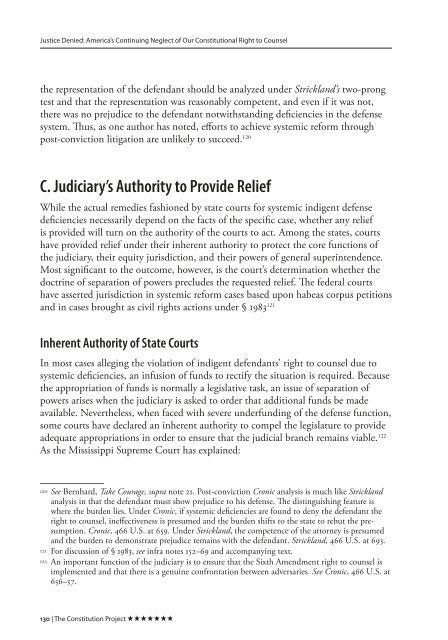Justice DenieD
Justice DenieD
Justice DenieD
You also want an ePaper? Increase the reach of your titles
YUMPU automatically turns print PDFs into web optimized ePapers that Google loves.
<strong>Justice</strong> Denied: America’s Continuing Neglect of Our Constitutional Right to Counsel<br />
the representation of the defendant should be analyzed under Strickland’s two-prong<br />
test and that the representation was reasonably competent, and even if it was not,<br />
there was no prejudice to the defendant notwithstanding deficiencies in the defense<br />
system. Thus, as one author has noted, efforts to achieve systemic reform through<br />
post-conviction litigation are unlikely to succeed. 120<br />
C. Judiciary’s Authority to Provide Relief<br />
While the actual remedies fashioned by state courts for systemic indigent defense<br />
deficiencies necessarily depend on the facts of the specific case, whether any relief<br />
is provided will turn on the authority of the courts to act. Among the states, courts<br />
have provided relief under their inherent authority to protect the core functions of<br />
the judiciary, their equity jurisdiction, and their powers of general superintendence.<br />
Most significant to the outcome, however, is the court’s determination whether the<br />
doctrine of separation of powers precludes the requested relief. The federal courts<br />
have asserted jurisdiction in systemic reform cases based upon habeas corpus petitions<br />
and in cases brought as civil rights actions under § 1983 121<br />
Inherent Authority of State Courts<br />
In most cases alleging the violation of indigent defendants’ right to counsel due to<br />
systemic deficiencies, an infusion of funds to rectify the situation is required. Because<br />
the appropriation of funds is normally a legislative task, an issue of separation of<br />
powers arises when the judiciary is asked to order that additional funds be made<br />
available. Nevertheless, when faced with severe underfunding of the defense function,<br />
some courts have declared an inherent authority to compel the legislature to provide<br />
adequate appropriations in order to ensure that the judicial branch remains viable. 122<br />
As the Mississippi Supreme Court has explained:<br />
120 See Bernhard, Take Courage, supra note 21. Post-conviction Cronic analysis is much like Strickland<br />
analysis in that the defendant must show prejudice to his defense. The distinguishing feature is<br />
where the burden lies. Under Cronic, if systemic deficiencies are found to deny the defendant the<br />
right to counsel, ineffectiveness is presumed and the burden shifts to the state to rebut the presumption.<br />
Cronic, 466 U.S. at 659. Under Strickland, the competence of the attorney is presumed<br />
and the burden to demonstrate prejudice remains with the defendant. Strickland, 466 U.S. at 693.<br />
121 For discussion of § 1983, see infra notes 152–69 and accompanying text.<br />
122 An important function of the judiciary is to ensure that the Sixth Amendment right to counsel is<br />
implemented and that there is a genuine confrontation between adversaries. See Cronic, 466 U.S. at<br />
656–57.<br />
130 | The Constitution Project


